Sustainable Entrepreneurship as a Field of Knowledge: Analyzing the Global South
Abstract
1. Introduction
2. Literature Review
2.1. Scientific Research in the Global South
2.2. Impact of Scientific Production
3. Method
4. Results
4.1. Performance Analysis
4.2. Science Mapping Analysis
4.2.1. Co-Citation
4.2.2. Bibliographic Coupling
4.2.3. Co-Word Analysis
4.3. Collaboration between Countries
4.4. Current Status and Future Research of Sustainable Entrepreneurship
5. Discussion and Conclusions
Author Contributions
Funding
Data Availability Statement
Conflicts of Interest
References
- Robson, P.J.A.; Wijbenga, F.; Parker, S.C. Entrepreneurship and Policy: Challenges and Directions for Future Research. Int. Small Bus. J. 2009, 27, 531–535. [Google Scholar] [CrossRef]
- Subramaniam, Y.; Masron, T.A. The Impact of Tourism on Entrepreneurship in Developing Countries. Bus. Strat. Dev. 2021, 5, 153–164. [Google Scholar] [CrossRef]
- Shepherd, D.A.; Patzelt, H. The New Field of Sustainable Entrepreneurship: Studying Entrepreneurial Action Linking “What Is to Be Sustained” with “What Is to Be Developed”. Entrep. Theory Pract. 2011, 35, 137–163. [Google Scholar] [CrossRef]
- Anderson, A.; Ronteau, S. Towards an Entrepreneurial Theory of Practice; Emerging Ideas for Emerging Economies. J. Entrep. Emerg. Econ. 2017, 9, 110–120. [Google Scholar] [CrossRef]
- Dodd, S.D.; Jack, S.; Anderson, A.R. From Admiration to Abhorrence: The Contentious Appeal of Entrepreneurship across Europe. Entrep. Reg. Dev. 2013, 25, 69–89. [Google Scholar] [CrossRef]
- Anderson, A.R.; Gaddefors, J. Is Entrepreneurship Research out of Context? J. Asia Entrep. Sustain. 2017, 13, 3–9. [Google Scholar]
- Welter, F.; Baker, T.; Wirsching, K. Three Waves and Counting: The Rising Tide of Contextualization in Entrepreneurship Research. Small Bus. Econ. 2019, 52, 319–330. [Google Scholar] [CrossRef]
- Dhahri, S.; Slimani, S.; Omri, A. Behavioral Entrepreneurship for Achieving the Sustainable Development Goals. Technol. Forecast. Soc. Chang. 2021, 165, 120561. [Google Scholar] [CrossRef]
- Global Entrepreneurship Monitor (GEM). Global Entrepreneurship Monitor 2021/2022 Global Report Opportunity Amid Disruption; Global Entrepreneurship Monitor (GEM): London, UK, 2022; ISBN 978-1-916017-89-4. [Google Scholar]
- Amankwah-Amoah, J.; Lu, Y. Historical Evolution of Entrepreneurial Development in the Global South: The Case of Ghana, 1957–2010. Sci. Public Policy 2019, 46, 161–172. [Google Scholar] [CrossRef]
- Oglesby, C. Vietnamism Has Failed… The Revolution Can Only Be Mauled, Not Defeated. Commonweal 1969, 90, 11–12. [Google Scholar]
- de Sousa Santos, B. Epistemologies of the South: Justice against Epistemicide; Routledge: New York, NY, USA, 2015; ISBN 978-1-315-63487-6. [Google Scholar]
- Confraria, H.; Mira Godinho, M.; Wang, L. Determinants of Citation Impact: A Comparative Analysis of the Global South versus the Global North. Res. Policy 2017, 46, 265–279. [Google Scholar] [CrossRef]
- Collyer, F.M. Global Patterns in the Publishing of Academic Knowledge: Global North, Global South. Curr. Sociol. 2018, 66, 56–73. [Google Scholar] [CrossRef]
- Newman, K. What Is the Evidence on the Impact of Research on International Development; Department for International Development (DFID): London, UK, 2014. [Google Scholar]
- Shibayama, S.; Baba, Y. Impact-Oriented Science Policies and Scientific Publication Practices: The Case of Life Sciences in Japan. Res. Policy 2015, 44, 936–950. [Google Scholar] [CrossRef]
- Ojediran, F.; Anderson, A. Women’s Entrepreneurship in the Global South: Empowering and Emancipating? Adm. Sci. 2020, 10, 87. [Google Scholar] [CrossRef]
- Sarason, Y. Toward Improving Impact of Sustainable Ventures in Developing Countries: A Structuration View (WITHDRAWN). Glob. Proc. 2020, Mexico, 100. [Google Scholar] [CrossRef]
- Blicharska, M.; Teutschbein, C.; Smithers, R.J. SDG Partnerships May Perpetuate the Global North–South Divide. Sci. Rep. 2021, 11, 22092. [Google Scholar] [CrossRef]
- Akobo, L.A. Action Learning through Radio: Exploring Conceptual Views and Lived Experiences of Women Entrepreneurs. Action Learn. Res. Pract. 2018, 15, 235–248. [Google Scholar] [CrossRef]
- Carree, M.A.; Thurik, A.R. The Impact of Entrepreneurship on Economic Growth. In Handbook of Entrepreneurship Research: An Interdisciplinary Survey and Introduction; Acs, Z.J., Audretsch, D.B., Eds.; International Handbook Series on Entrepreneurship; Springer: New York, NY, USA, 2010; pp. 557–594. ISBN 978-1-4419-1191-9. [Google Scholar]
- Guenther, T.W. How Should We Deal with Submissions from the Global South? An Editorial. J. Manag. Control 2020, 31, 153–155. [Google Scholar] [CrossRef]
- Baber, Z. Provincial Universalism: The Landscape of Knowledge Production in an Era of Globalization. Curr. Sociol. 2003, 51, 615–623. [Google Scholar] [CrossRef]
- Murphy, J.; Zhu, J. Neo-Colonialism in the Academy? Anglo-American Domination in Management Journals. Organization 2012, 19, 915–927. [Google Scholar] [CrossRef]
- Danell, R. Geographical Diversity and Changing Communication Regimes: A Study of Publication Activity and International Citation Patterns. In Social Science in Context: Historical, Sociological, and Global Perspectives; Nordic Academic Press: Lund, Sweden, 2013; pp. 177–190. [Google Scholar]
- Moed, H.F. Citation Analysis in Research Evaluation; Springer Science & Business Media: New York, NY, USA, 2006; ISBN 978-1-4020-3714-6. [Google Scholar]
- Smith, M.J.; Weinberger, C.; Bruna, E.M.; Allesina, S. The Scientific Impact of Nations: Journal Placement and Citation Performance. PLoS ONE 2014, 9, e109195. [Google Scholar] [CrossRef] [PubMed]
- Varshney, D.; Atkins, S.; Das, A.; Diwan, V. Understanding Collaboration in a Multi-National Research Capacity-Building Partnership: A Qualitative Study. Health Res. Policy Syst. 2016, 14, 64. [Google Scholar] [CrossRef] [PubMed]
- Nelson, R.R. The Roles of Research in Universities and Public Labs in Economic Catch-Up. In Technological Change and Economic Catch-Up; Edward Elgar Publishing: Cheltenham, UK, 2005; p. 3904. ISBN 978-1-84542-817-4. [Google Scholar]
- Kreimer, P.; Zabala, J.P. What Knowledge and for Whom? Social Problems Production and use of Sceintific Knowledge on Chagas Disease in Argentina. Rev. D Anthropol. Connaiss. 2008, 2, 413–439. [Google Scholar] [CrossRef]
- de George, R. Rethinking Global Business Ethics: The North-South Paradigm: Business and Society Review. Bus. Soc. Rev. 2017, 122, 5–25. [Google Scholar] [CrossRef]
- Donthu, N.; Kumar, S.; Mukherjee, D.; Pandey, N.; Lim, W.M. How to Conduct a Bibliometric Analysis: An Overview and Guidelines. J. Bus. Res. 2021, 133, 285–296. [Google Scholar] [CrossRef]
- Bhardwaj, A.K.; Garg, A.; Ram, S.; Gajpal, Y.; Zheng, C. Research Trends in Green Product for Environment: A Bibliometric Perspective. Int. J. Environ. Res. Public Health 2020, 17, 8469. [Google Scholar] [CrossRef]
- Aria, M.; Cuccurullo, C. Bibliometrix: An R-Tool for Comprehensive Science Mapping Analysis. J. Informetr. 2017, 11, 959–975. [Google Scholar] [CrossRef]
- Koe Hwee Nga, J.; Shamuganathan, G. The Influence of Personality Traits and Demographic Factors on Social Entrepreneurship Start up Intentions. J. Bus. Ethics 2010, 95, 259–282. [Google Scholar] [CrossRef]
- Lazzarini, S.G. Strategizing by the Government: Can Industrial Policy Create Firm-Level Competitive Advantage? Strateg. Manag. J. 2015, 36, 97–112. [Google Scholar] [CrossRef]
- Fathian, M.; Akhavan, P.; Hoorali, M. E-Readiness Assessment of Non-Profit ICT SMEs in a Developing Country: The Case of Iran. Technovation 2008, 28, 578–590. [Google Scholar] [CrossRef]
- Anwar, M. Business Model Innovation and SMEs Performance—Does Competitive Advantage Mediate? Int. J. Innov. Manag. 2018, 22, 1850057. [Google Scholar] [CrossRef]
- Khan, S.Z.; Yang, Q.; Waheed, A. Investment in Intangible Resources and Capabilities Spurs Sustainable Competitive Advantage and Firm Performance. Corp. Soc. Responsib. Environ. Manag. 2019, 26, 285–295. [Google Scholar] [CrossRef]
- Schaltegger, S.; Wagner, M. Sustainable Entrepreneurship and Sustainability Innovation: Categories and Interactions. Bus. Strategy Environ. 2011, 20, 222–237. [Google Scholar] [CrossRef]
- Doherty, B.; Haugh, H.; Lyon, F. Social Enterprises as Hybrid Organizations: A Review and Research Agenda. Int. J. Manag. Rev. 2014, 16, 417–436. [Google Scholar] [CrossRef]
- Dean, T.J.; McMullen, J.S. Toward a Theory of Sustainable Entrepreneurship: Reducing Environmental Degradation through Entrepreneurial Action. J. Bus. Ventur. 2007, 22, 50–76. [Google Scholar] [CrossRef]
- Cohen, B.; Winn, M.I. Market Imperfections, Opportunity and Sustainable Entrepreneurship. J. Bus. Ventur. 2007, 22, 29–49. [Google Scholar] [CrossRef]
- Vohora, A.; Wright, M.; Lockett, A. Critical Junctures in the Development of University High-Tech Spinout Companies. Res. Policy 2004, 33, 147–175. [Google Scholar] [CrossRef]
- Barney, J. Firm Resources and Sustained Competitive Advantage. J. Manag. 1991, 17, 99–120. [Google Scholar] [CrossRef]
- Lumpkin, G.T.; Dess, G.G. Clarifying the Entrepreneurial Orientation Construct and Linking It to Performance. Acad. Manag. Rev. 1996, 21, 135–172. [Google Scholar] [CrossRef]
- Austin, J.; Stevenson, H.; Wei–Skillern, J. Social and Commercial Entrepreneurship: Same, Different, or Both? Entrep. Theory Pract. 2006, 30, 1–22. [Google Scholar] [CrossRef]
- Hall, J.K.; Daneke, G.A.; Lenox, M.J. Sustainable Development and Entrepreneurship: Past Contributions and Future Directions. J. Bus. Ventur. 2010, 25, 439–448. [Google Scholar] [CrossRef]
- Mair, J.; Martí, I. Social Entrepreneurship Research: A Source of Explanation, Prediction, and Delight. J. World Bus. 2006, 41, 36–44. [Google Scholar] [CrossRef]
- Shane, S.; Venkataraman, S. The Promise of Entrepreneurship as a Field of Research. AMR 2000, 25, 217–226. [Google Scholar] [CrossRef]
- Covin, J.G.; Slevin, D.P. Strategic Management of Small Firms in Hostile and Benign Environments. Strateg. Manag. J. 1989, 10, 75–87. [Google Scholar] [CrossRef]
- Fornell, C.; Larcker, D.F. Evaluating Structural Equation Models with Unobservable Variables and Measurement Error. J. Mark. Res. 1981, 18, 39–50. [Google Scholar] [CrossRef]
- Hair, J.F., Jr.; Sarstedt, M.; Hopkins, L.; Kuppelwieser, G.V. Partial Least Squares Structural Equation Modeling (PLS-SEM): An Emerging Tool in Business Research. Eur. Bus. Rev. 2014, 26, 106–121. [Google Scholar] [CrossRef]
- Podsakoff, P.M.; MacKenzie, S.B.; Lee, J.-Y.; Podsakoff, N.P. Common Method Biases in Behavioral Research: A Critical Review of the Literature and Recommended Remedies. J. Appl. Psychol. 2003, 88, 879–903. [Google Scholar] [CrossRef]
- Teece, D.J.; Pisano, G.; Shuen, A. Dynamic Capabilities and Strategic Management. Strateg. Manag. J. 1997, 18, 509–533. [Google Scholar] [CrossRef]
- Cohen, B.; Amorós, J.E. Municipal Demand-Side Policy Tools and the Strategic Management of Technology Life Cycles. Technovation 2014, 34, 797–806. [Google Scholar] [CrossRef]
- Omri, A. Entrepreneurship, Sectoral Outputs and Environmental Improvement: International Evidence. Technol. Forecast. Soc. Chang. 2018, 128, 46–55. [Google Scholar] [CrossRef]
- Pan, X.; Zhang, J.; Song, M.; Ai, B. Innovation Resources Integration Pattern in High-Tech Entrepreneurial Enterprises. Int. Entrep. Manag. J. 2018, 14, 51–66. [Google Scholar] [CrossRef]
- Xie, X.; Zeng, S.; Peng, Y.; Tam, C. What Affects the Innovation Performance of Small and Medium-Sized Enterprises in China? Innovation 2013, 15, 271–286. [Google Scholar] [CrossRef]
- Yu, Y.; Dong, X.-Y.; Shen, K.N.; Khalifa, M.; Hao, J.-X. Strategies, Technologies, and Organizational Learning for Developing Organizational Innovativeness in Emerging Economies. J. Bus. Res. 2013, 66, 2507–2514. [Google Scholar] [CrossRef]
- Yunis, M.; El-Kassar, A.-N.; Tarhini, A. Impact of ICT-Based Innovations on Organizational Performance: The Role of Corporate Entrepreneurship. J. Enterp. Inf. Manag. 2017, 30, 122–141. [Google Scholar] [CrossRef]
- Suntikul, W.; Jachna, T. Contestation and Negotiation of Heritage Conservation in Luang Prabang, Laos. Tour. Manag. 2013, 38, 57–68. [Google Scholar] [CrossRef]
- Dionisio, M. The Evolution of Social Entrepreneurship Research: A Bibliometric Analysis. Soc. Enterp. J. 2018, 15, 22–45. [Google Scholar] [CrossRef]
- Jabeen, F.; Faisal, M.N.; Katsioloudes, I.M. Entrepreneurial Mindset and the Role of Universities as Strategic Drivers of Entrepreneurship: Evidence from the United Arab Emirates. J. Small Bus. Enterp. Dev. 2017, 24, 136–157. [Google Scholar] [CrossRef]
- Roy, K.; Karna, A. Doing Social Good on a Sustainable Basis: Competitive Advantage of Social Businesses. Manag. Decis. 2015, 53, 1355–1374. [Google Scholar] [CrossRef]
- Bamgbade, J.A.; Kamaruddeen, A.M.; Nawi, M.N.M.; Yusoff, R.Z.; Bin, R.A. Does Government Support Matter? Influence of Organizational Culture on Sustainable Construction among Malaysian Contractors. Int. J. Constr. Manag. 2018, 18, 93–107. [Google Scholar] [CrossRef]
- Ng, H.S.; Kee, D.M.H. The Core Competence of Successful Owner-Managed SMEs. Manag. Decis. 2018, 56, 252–272. [Google Scholar] [CrossRef]
- Martens, C.D.P.; Machado, F.J.; Martens, M.L.; de Oliveira e Silva, F.Q.P.; de Freitas, H.M.R. Linking Entrepreneurial Orientation to Project Success. Int. J. Proj. Manag. 2018, 36, 255–266. [Google Scholar] [CrossRef]
- Buli, B.M. Entrepreneurial Orientation, Market Orientation and Performance of SMEs in the Manufacturing Industry: Evidence from Ethiopian Enterprises. Manag. Res. Rev. 2017, 40, 292–309. [Google Scholar] [CrossRef]
- Jaafar, M.; Rasoolimanesh, S.M.; Lonik, K.A.T. Tourism Growth and Entrepreneurship: Empirical Analysis of Development of Rural Highlands. Tour. Manag. Perspect. 2015, 14, 17–24. [Google Scholar] [CrossRef]
- Chabowski, B.R.; Mena, J.A.; Gonzalez-Padron, T.L. The Structure of Sustainability Research in Marketing, 1958–2008: A Basis for Future Research Opportunities. J. Acad. Mark. Sci. 2011, 39, 55–70. [Google Scholar] [CrossRef]
- Etzion, D.; Ferraro, F. The Role of Analogy in the Institutionalization of Sustainability Reporting. Organ. Sci. 2010, 21, 1092–1107. [Google Scholar] [CrossRef]
- Neubaum, D.O.; Zahra, S.A. Institutional Ownership and Corporate Social Performance: The Moderating Effects of Investment Horizon, Activism, and Coordination. J. Manag. 2006, 32, 108–131. [Google Scholar] [CrossRef]
- Paulraj, A. Understanding the Relationships Between Internal Resources and Capabilities, Sustainable Supply Management and Organizational Sustainability. J. Supply Chain. Manag. 2011, 47, 19–37. [Google Scholar] [CrossRef]
- Schot, J.; Steinmueller, W.E. Three Frames for Innovation Policy: R&D, Systems of Innovation and Transformative Change. Res. Policy 2018, 47, 1554–1567. [Google Scholar] [CrossRef]
- van der Have, R.P.; Rubalcaba, L. Social Innovation Research: An Emerging Area of Innovation Studies? Res. Policy 2016, 45, 1923–1935. [Google Scholar] [CrossRef]
- Bohnsack, R.; Pinkse, J.; Kolk, A. Business Models for Sustainable Technologies: Exploring Business Model Evolution in the Case of Electric Vehicles. Res. Policy 2014, 43, 284–300. [Google Scholar] [CrossRef]
- Hockerts, K.; Wüstenhagen, R. Greening Goliaths versus Emerging Davids—Theorizing about the Role of Incumbents and New Entrants in Sustainable Entrepreneurship. J. Bus. Ventur. 2010, 25, 481–492. [Google Scholar] [CrossRef]
- Linder, M.; Williander, M. Circular Business Model Innovation: Inherent Uncertainties. Bus. Strategy Environ. 2017, 26, 182–196. [Google Scholar] [CrossRef]
- Parrish, B.D. Sustainability-Driven Entrepreneurship: Principles of Organization Design. J. Bus. Ventur. 2010, 25, 510–523. [Google Scholar] [CrossRef]
- Schaltegger, S.; Lüdeke-Freund, F.; Hansen, E.G. Business Models for Sustainability: A Co-Evolutionary Analysis of Sustainable Entrepreneurship, Innovation, and Transformation. Organ. Environ. 2016, 29, 264–289. [Google Scholar] [CrossRef]
- Meek, W.R.; Pacheco, D.F.; York, J.G. The Impact of Social Norms on Entrepreneurial Action: Evidence from the Environmental Entrepreneurship Context. J. Bus. Ventur. 2010, 25, 493–509. [Google Scholar] [CrossRef]
- Pacheco, D.F.; Dean, T.J.; Payne, D.S. Escaping the Green Prison: Entrepreneurship and the Creation of Opportunities for Sustainable Development. J. Bus. Ventur. 2010, 25, 464–480. [Google Scholar] [CrossRef]
- York, J.G.; Venkataraman, S. The Entrepreneur–Environment Nexus: Uncertainty, Innovation, and Allocation. J. Bus. Ventur. 2010, 25, 449–463. [Google Scholar] [CrossRef]
- Jenkins, H. A “Business Opportunity” Model of Corporate Social Responsibility for Small- and Medium-Sized Enterprises. Bus. Ethics Eur. Rev. 2009, 18, 21–36. [Google Scholar] [CrossRef]
- Kuckertz, A.; Wagner, M. The Influence of Sustainability Orientation on Entrepreneurial Intentions—Investigating the Role of Business Experience. J. Bus. Ventur. 2010, 25, 524–539. [Google Scholar] [CrossRef]
- Ryan, C. Equity, Management, Power Sharing and Sustainability—Issues of the “New Tourism”. Tour. Manag. 2002, 23, 17–26. [Google Scholar] [CrossRef]
- Santos, F.M. A Positive Theory of Social Entrepreneurship. J. Bus. Ethics 2012, 111, 335–351. [Google Scholar] [CrossRef]
- Agbo, F.J.; Oyelere, S.S.; Suhonen, J.; Tukiainen, M. Scientific Production and Thematic Breakthroughs in Smart Learning Environments: A Bibliometric Analysis. Smart Learn. Environ. 2021, 8, 1–25. [Google Scholar] [CrossRef]
- Zhang, J.; Yu, Q.; Zheng, F.; Long, C.; Lu, Z.; Duan, Z. Comparing Keywords plus of WOS and Author Keywords: A Case Study of Patient Adherence Research. J. Assoc. Inf. Sci. Technol. 2016, 67, 967–972. [Google Scholar] [CrossRef]
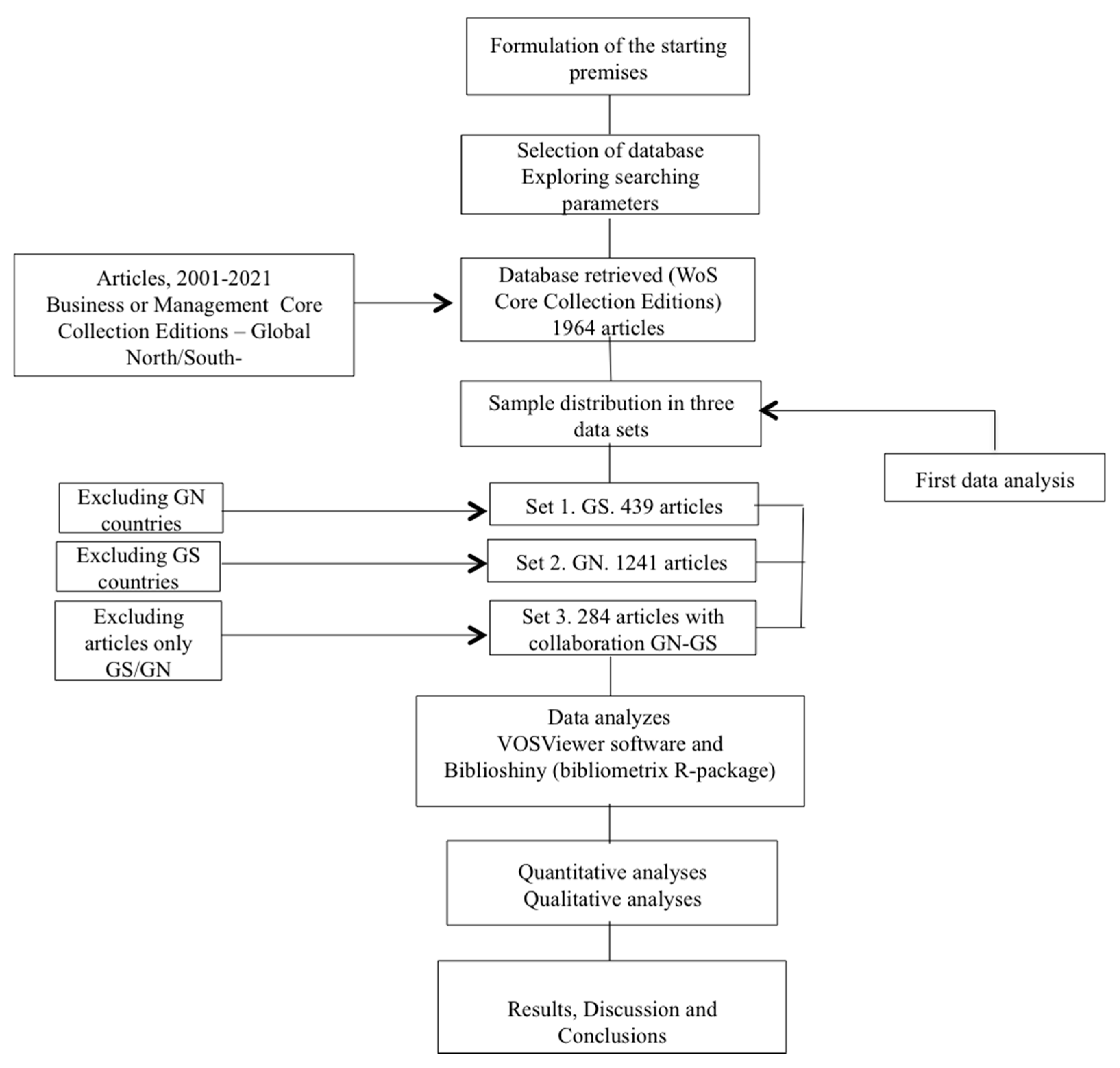
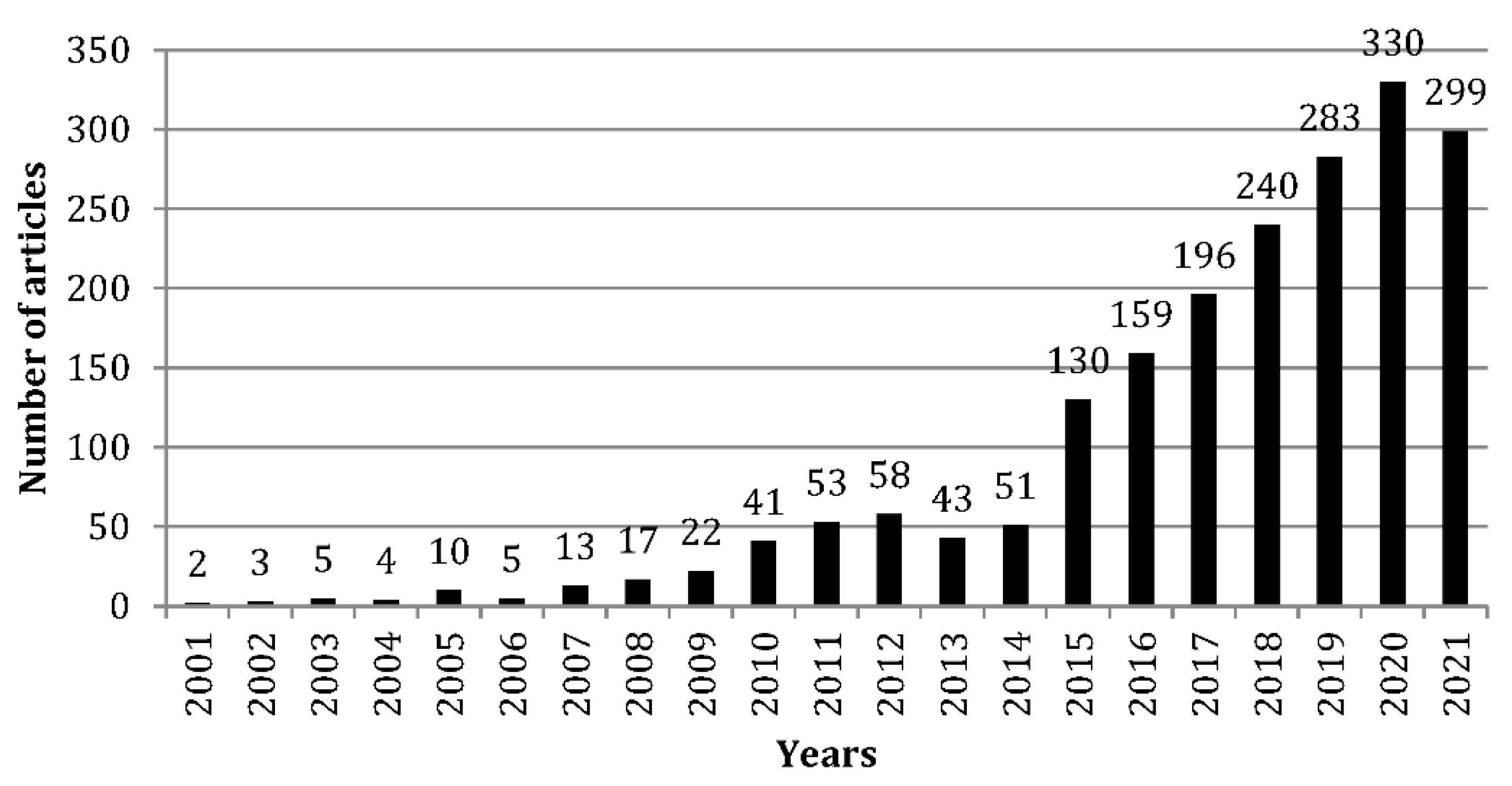
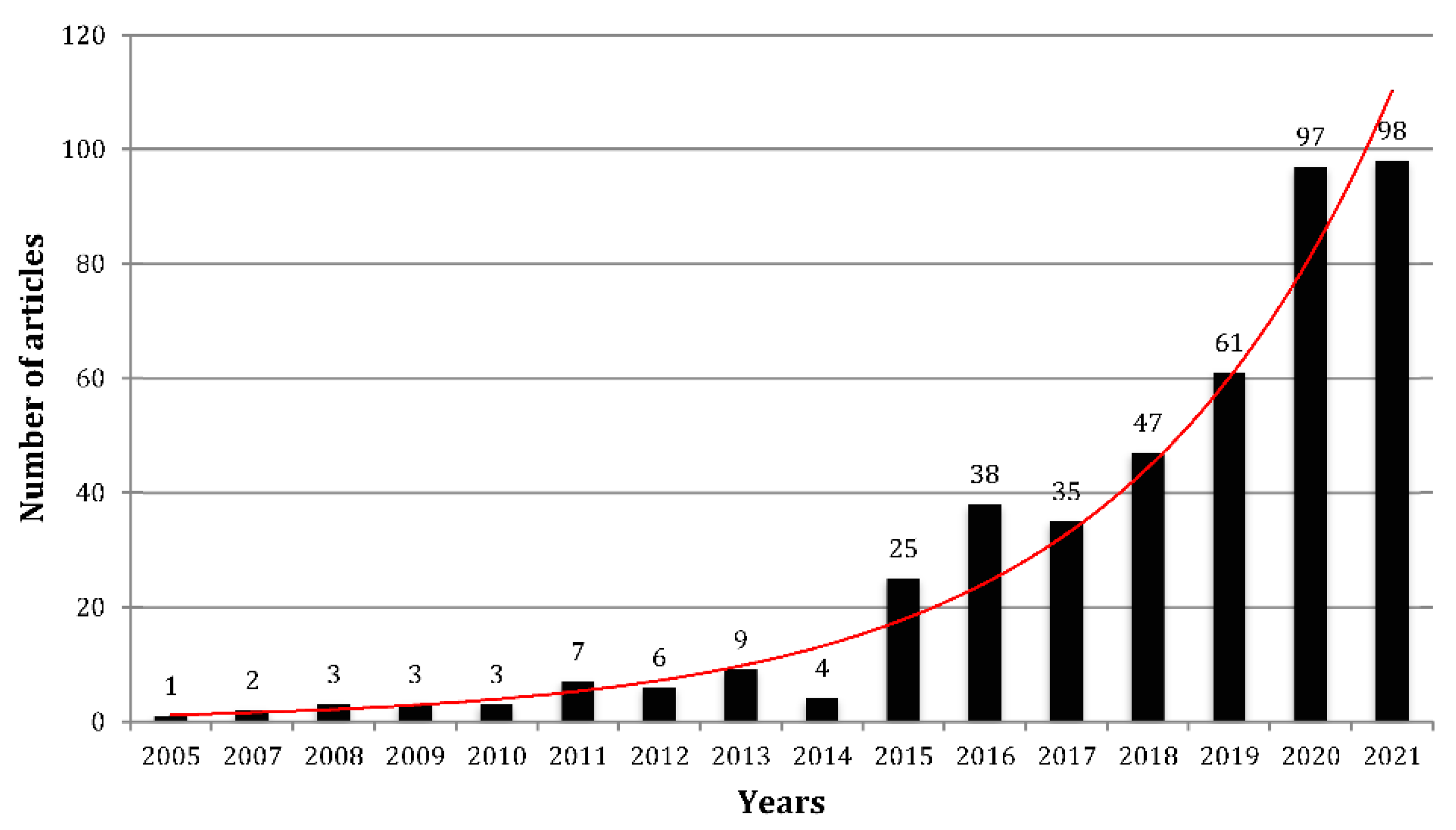
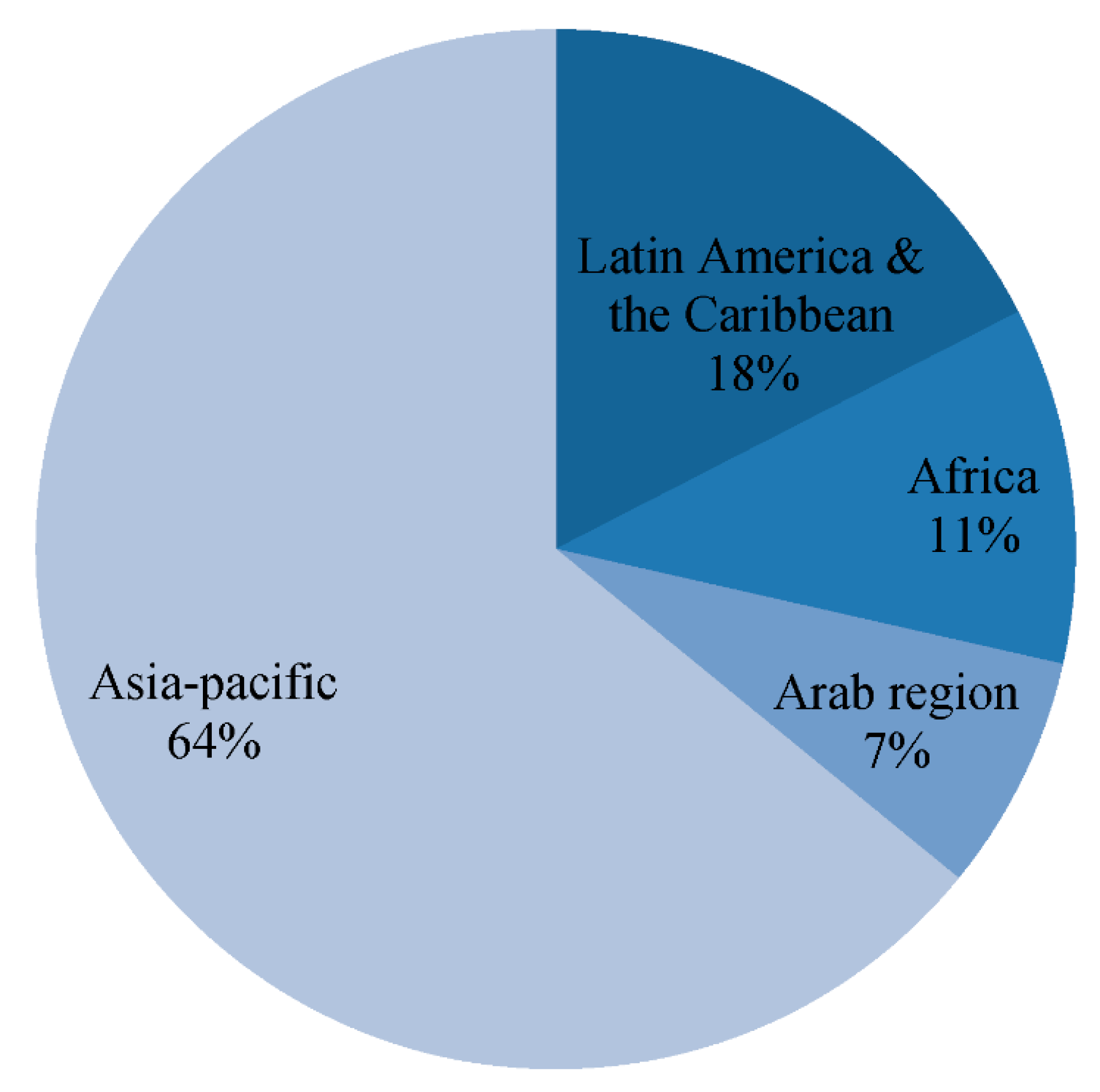
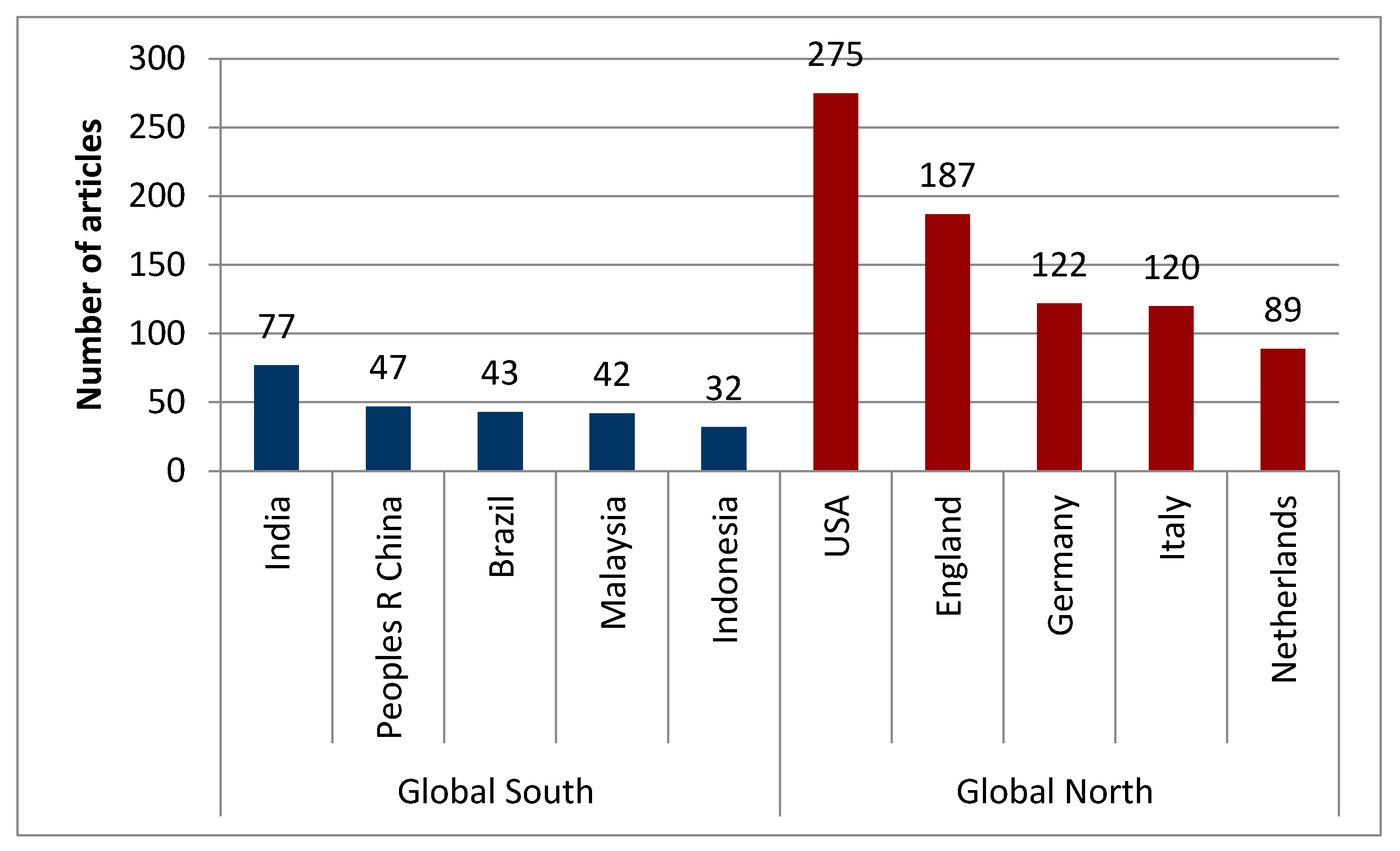
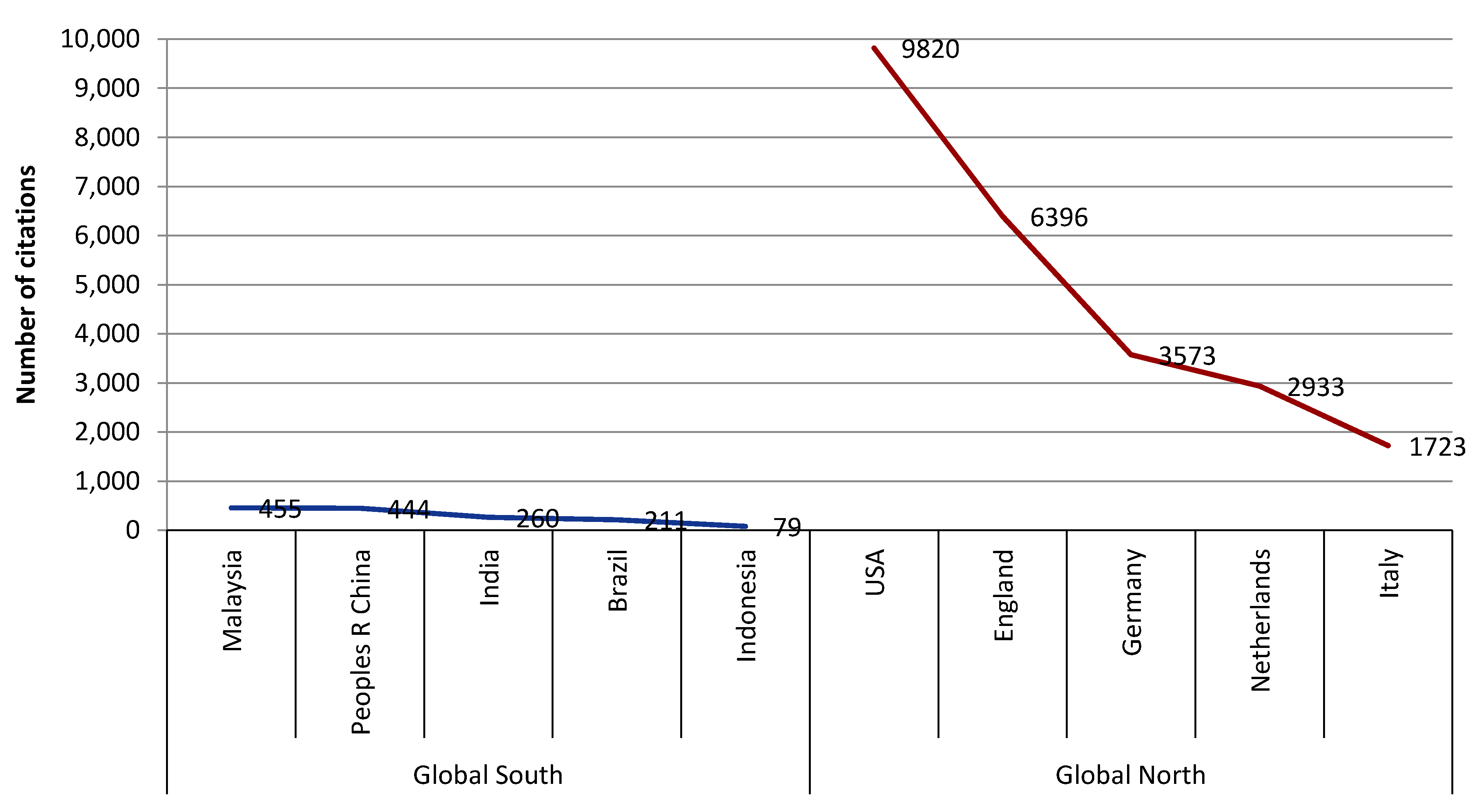
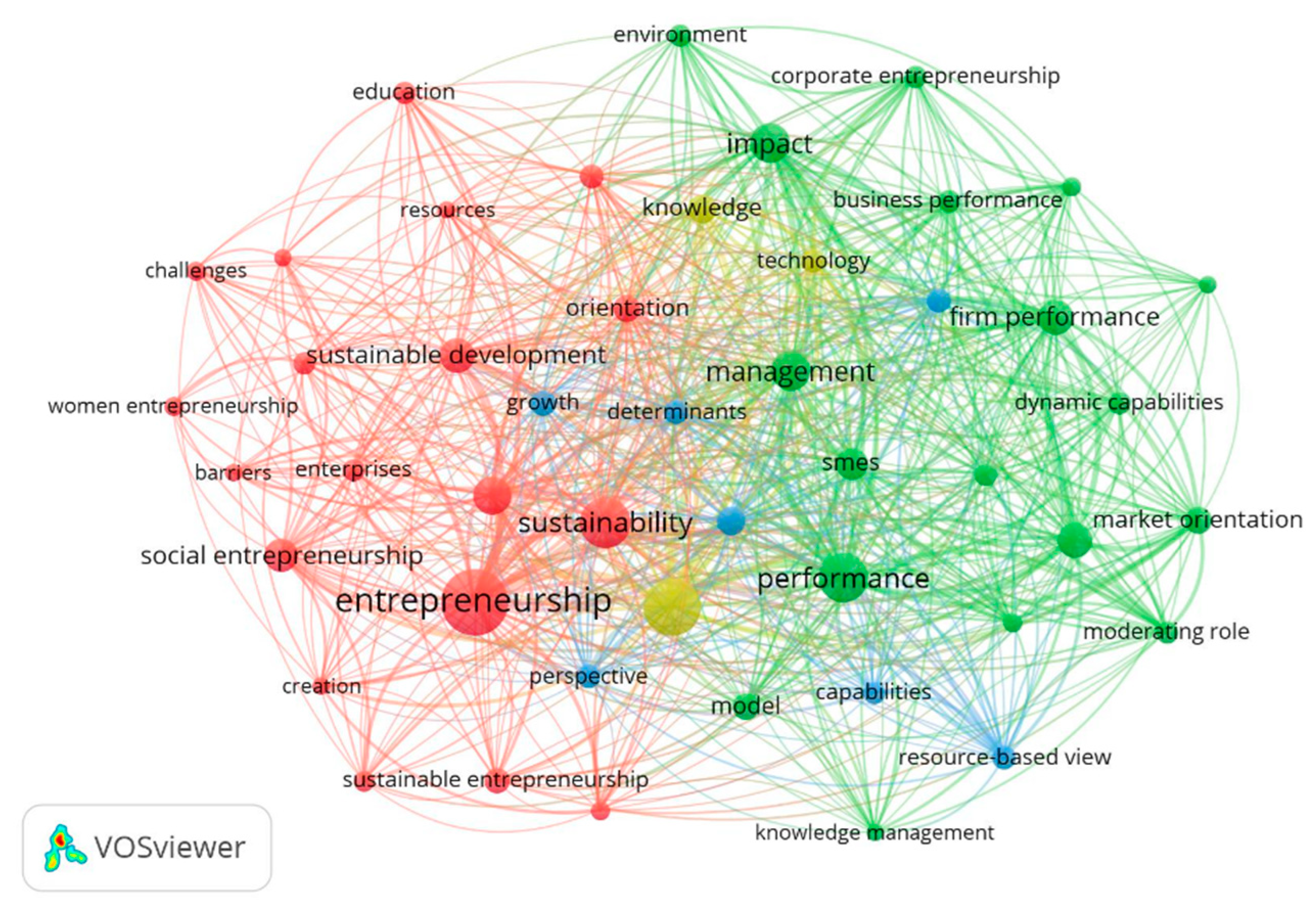
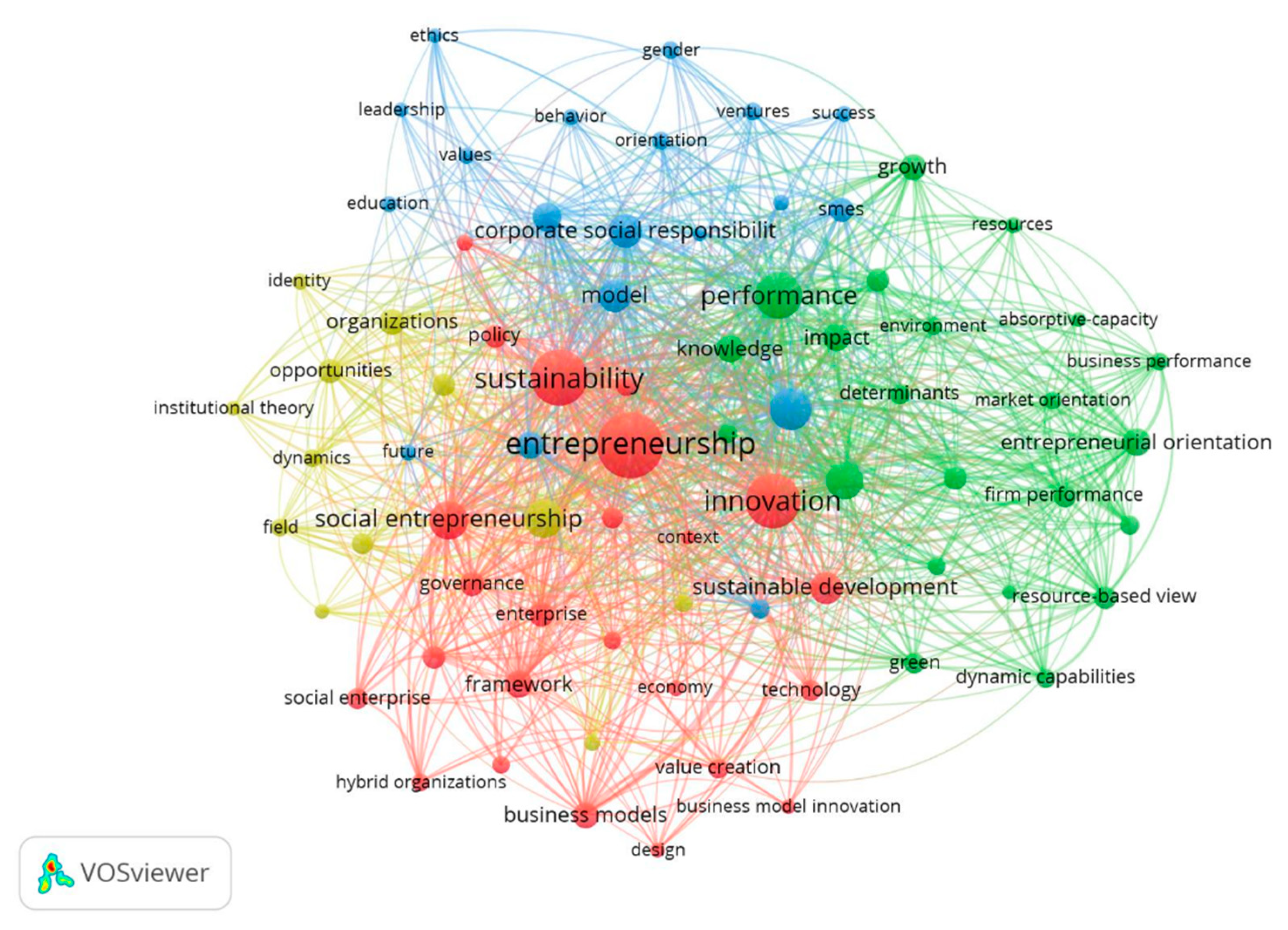
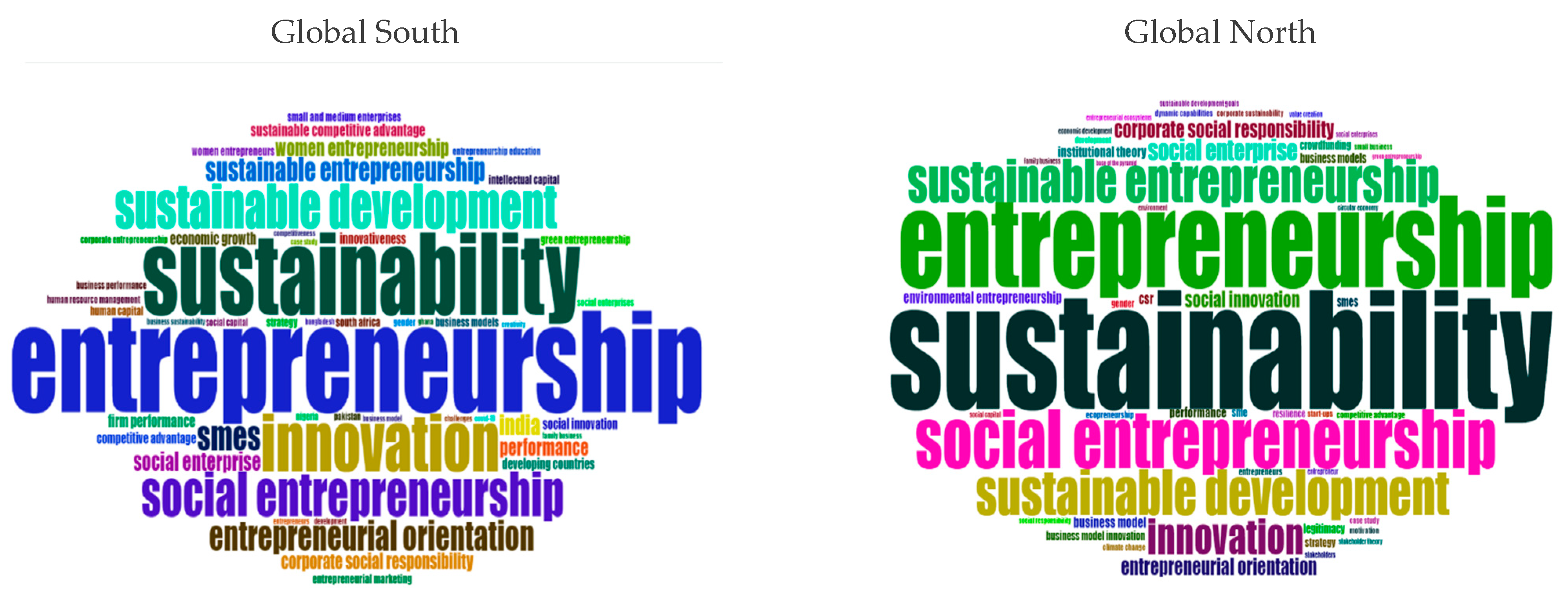
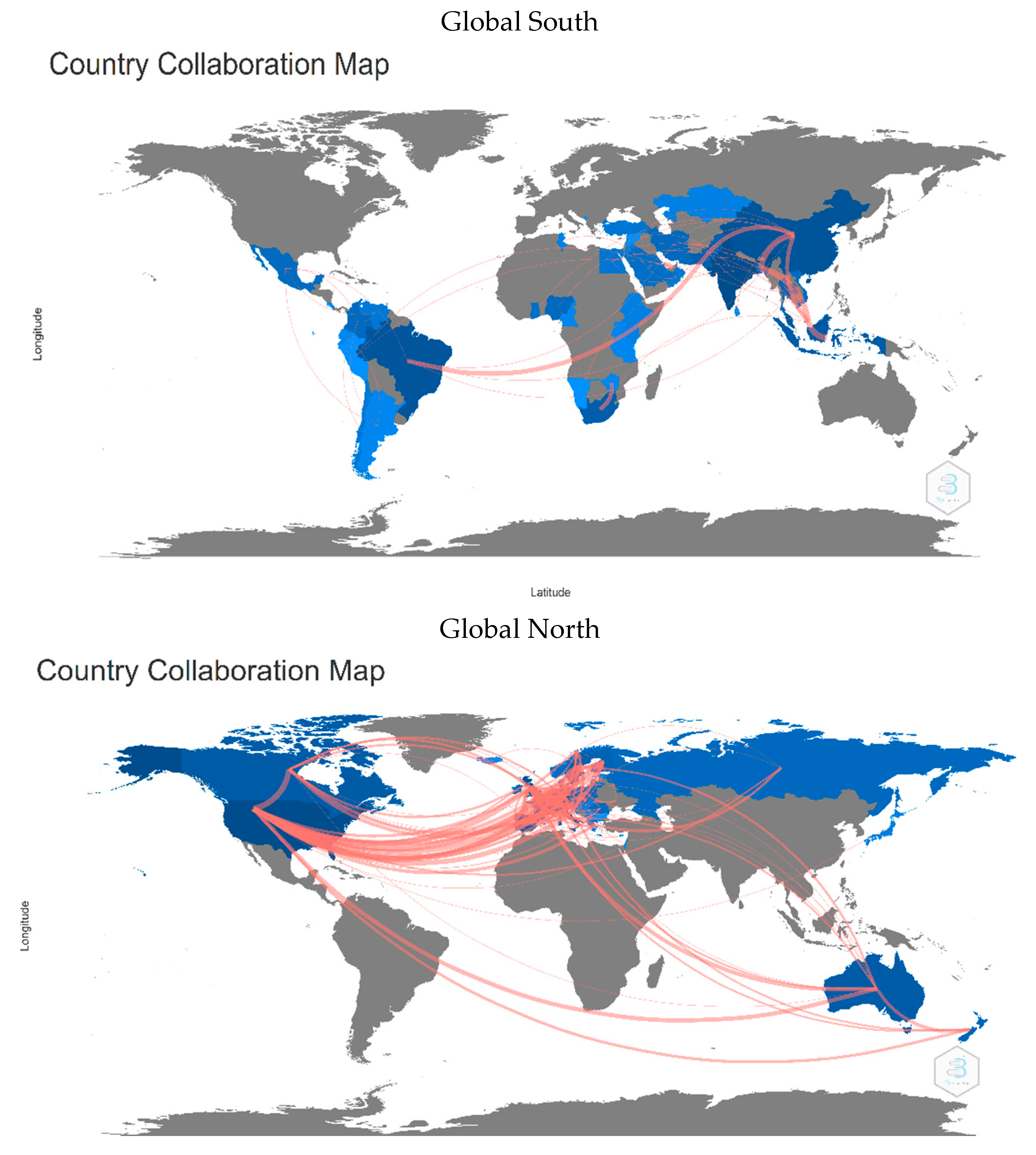
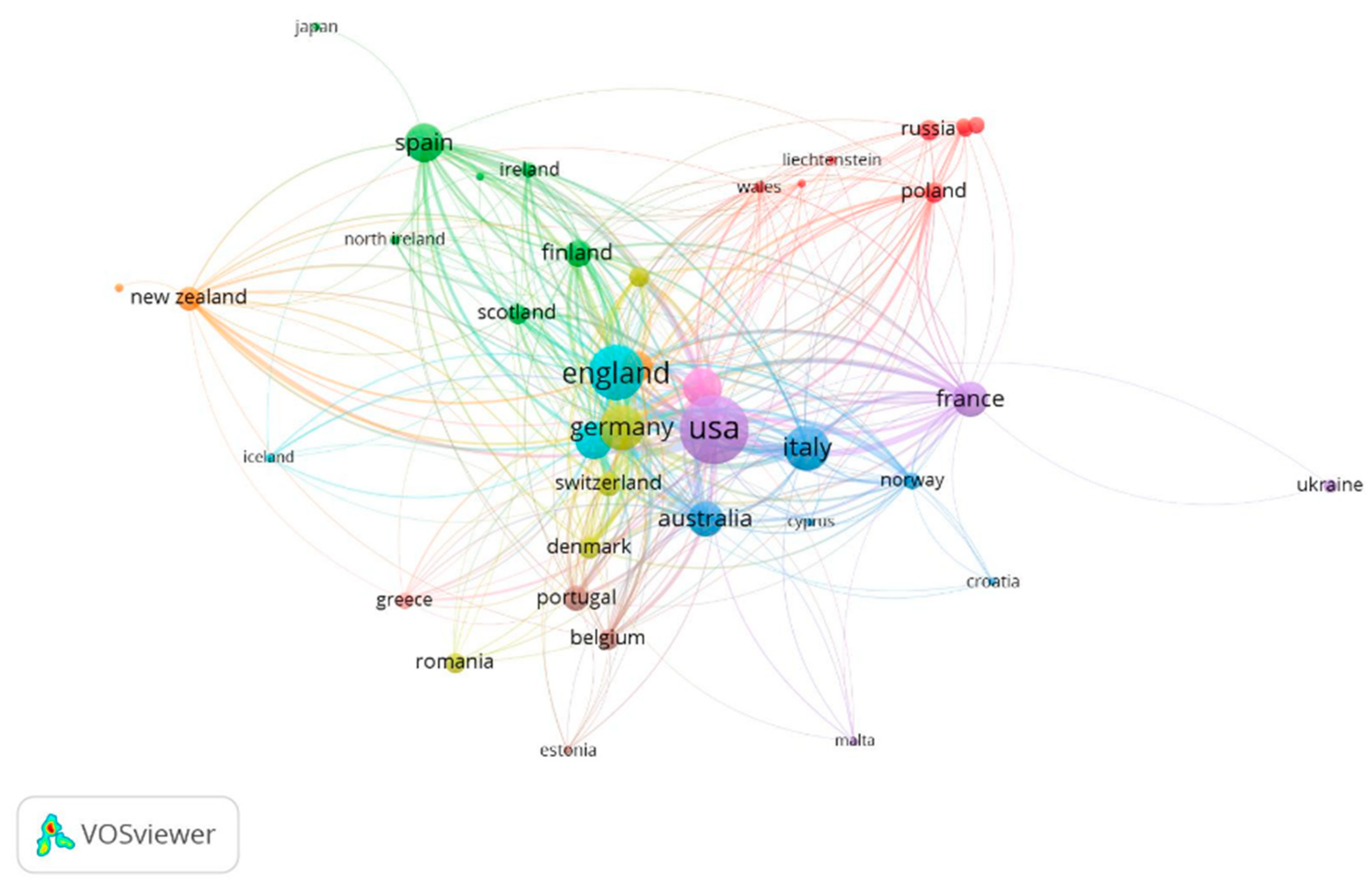
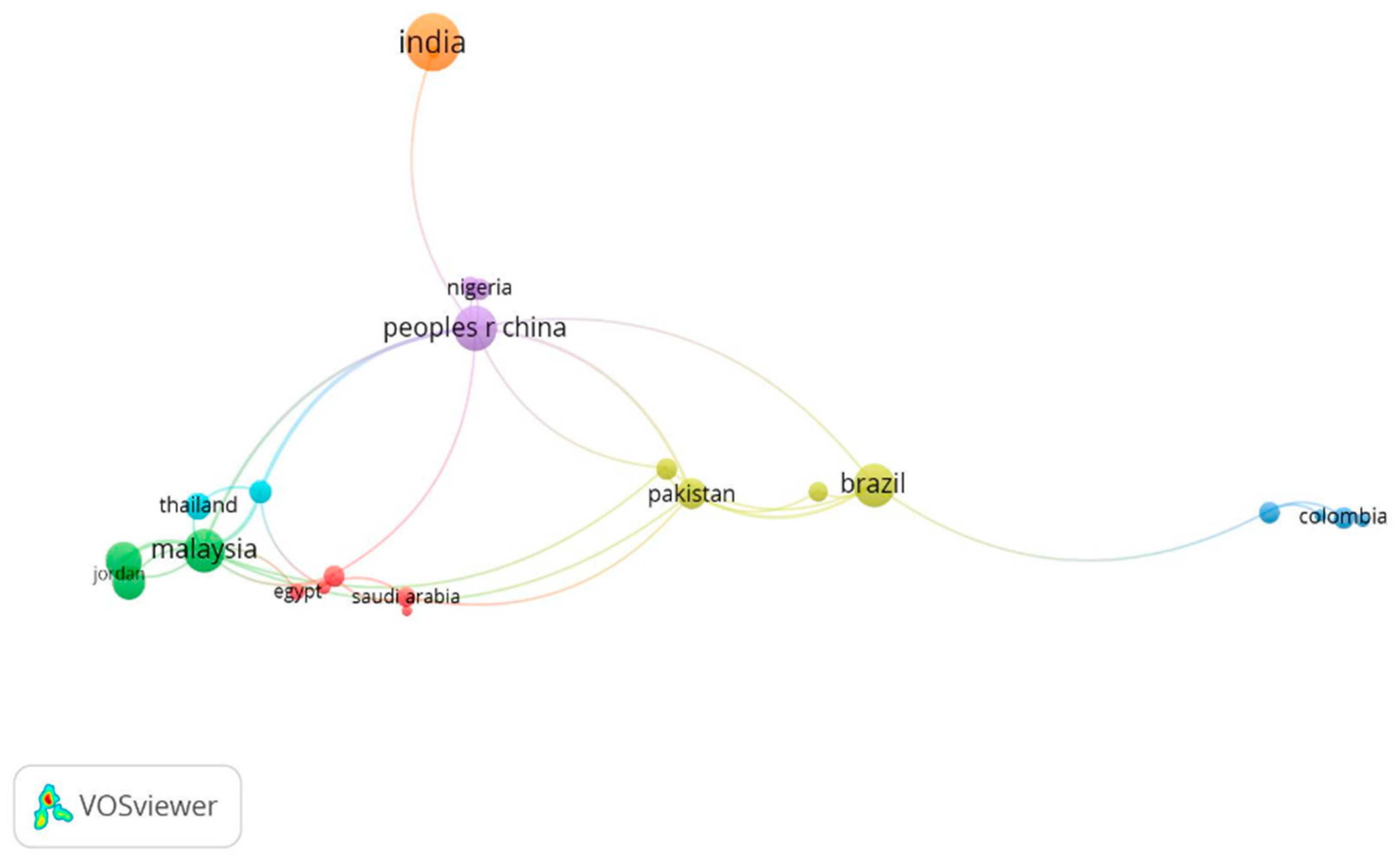
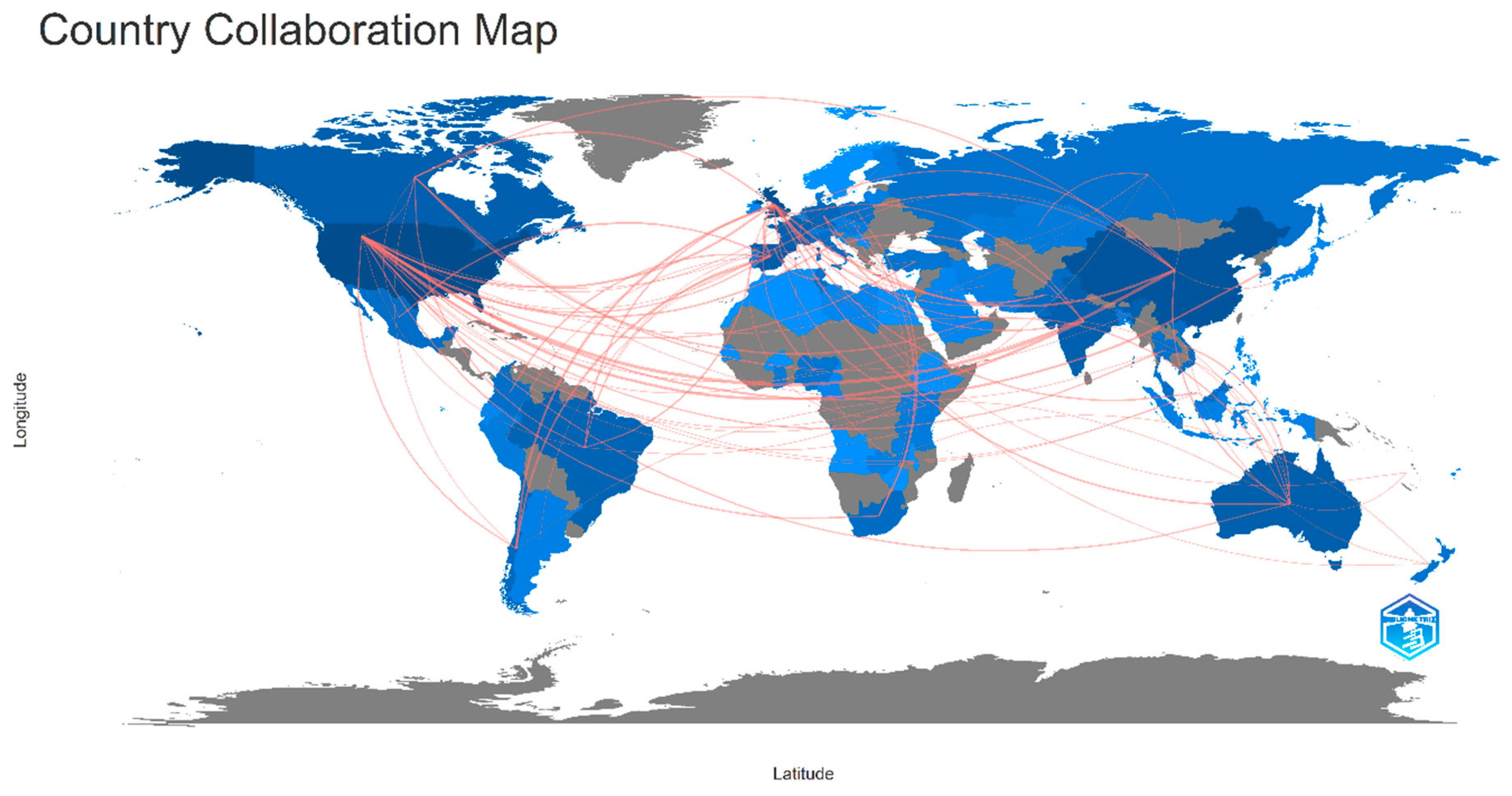
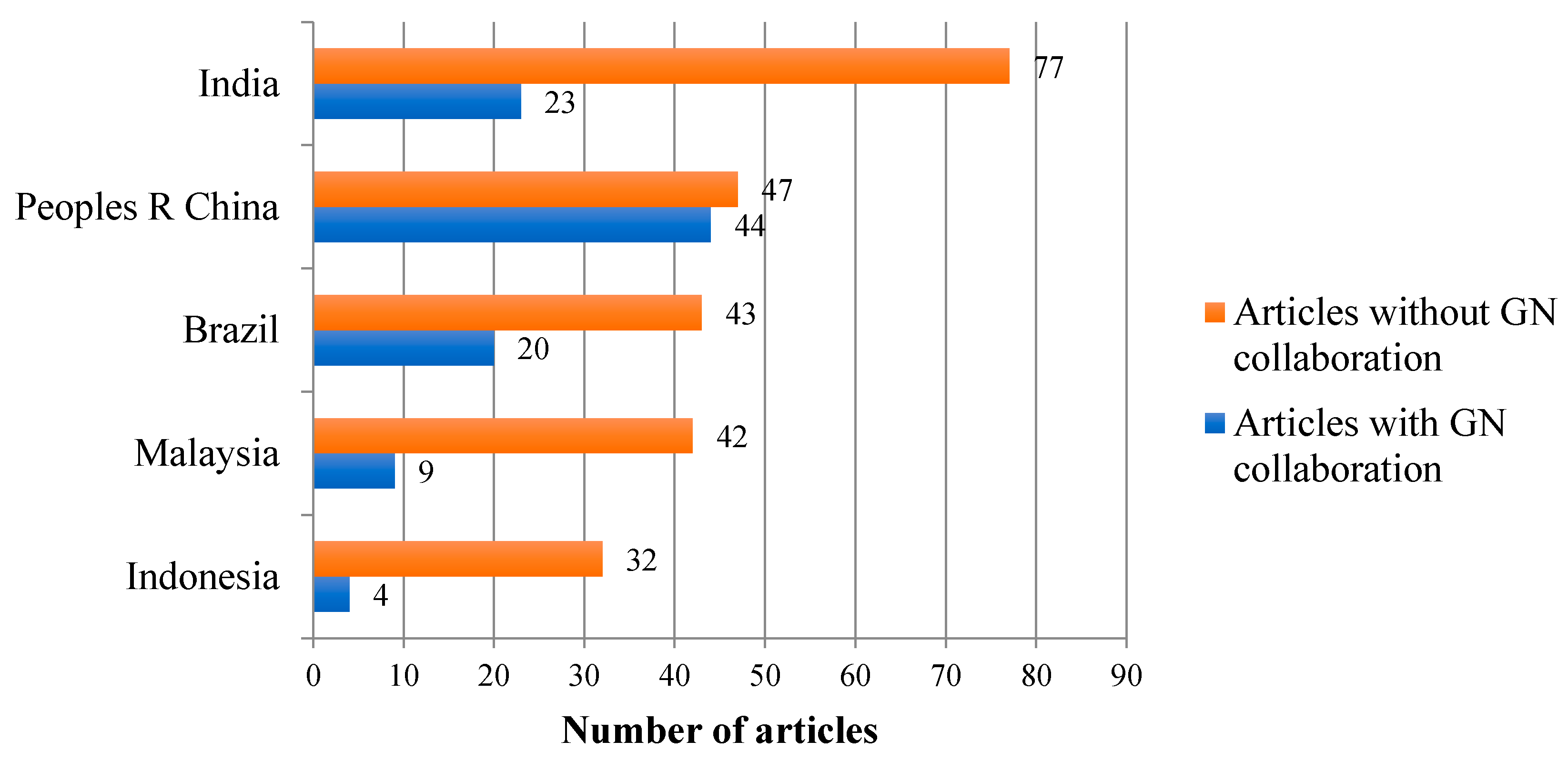
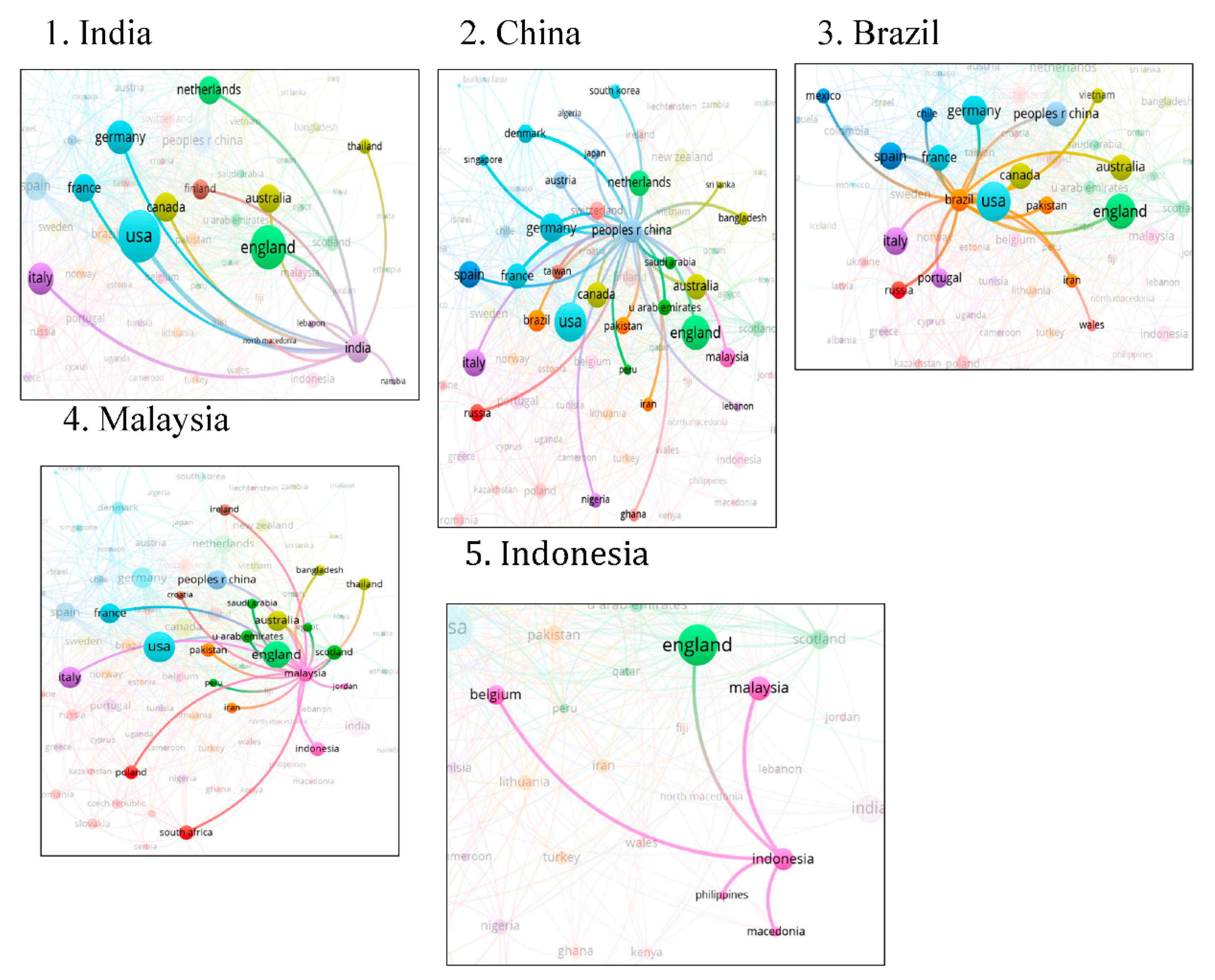
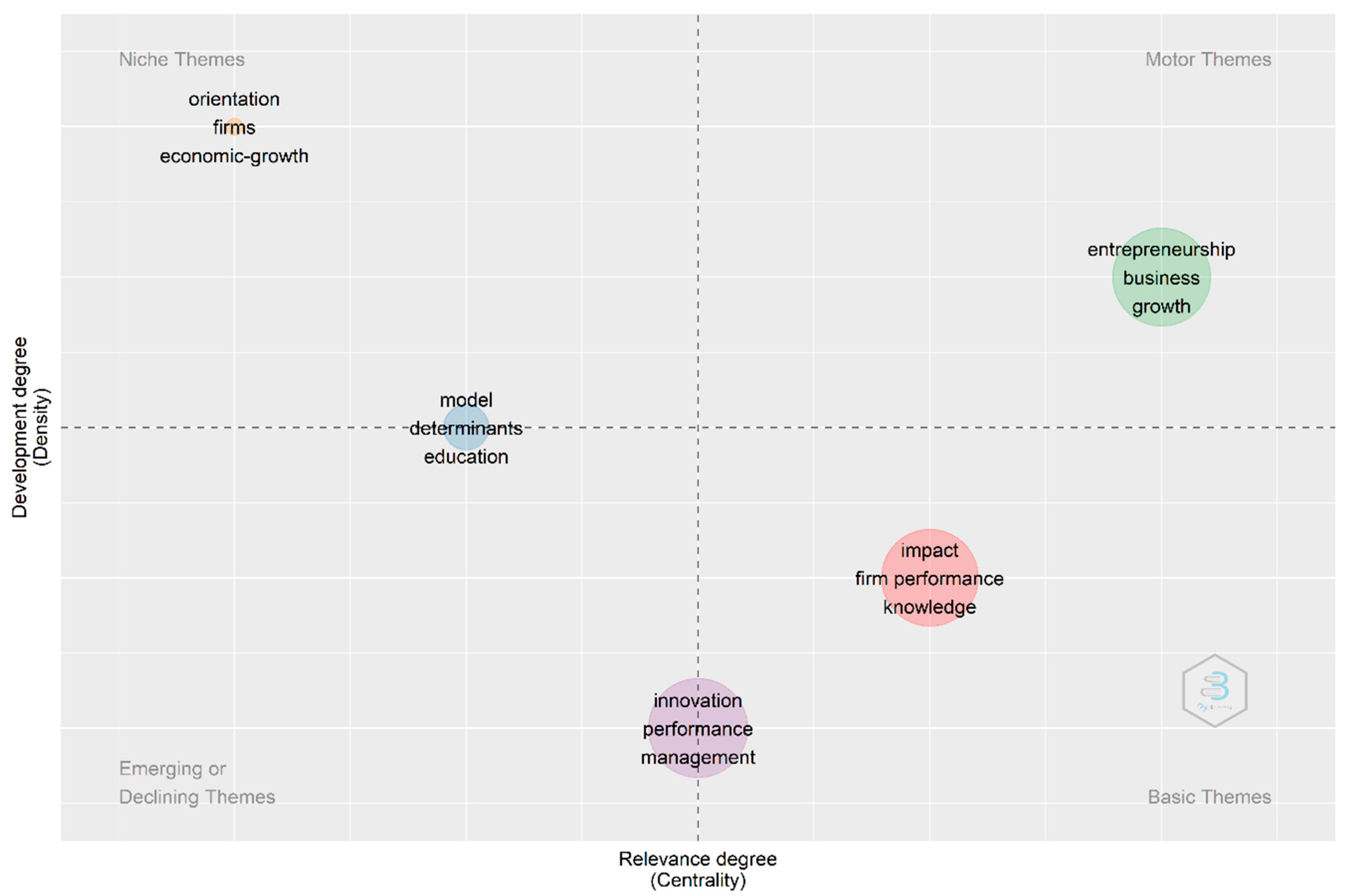
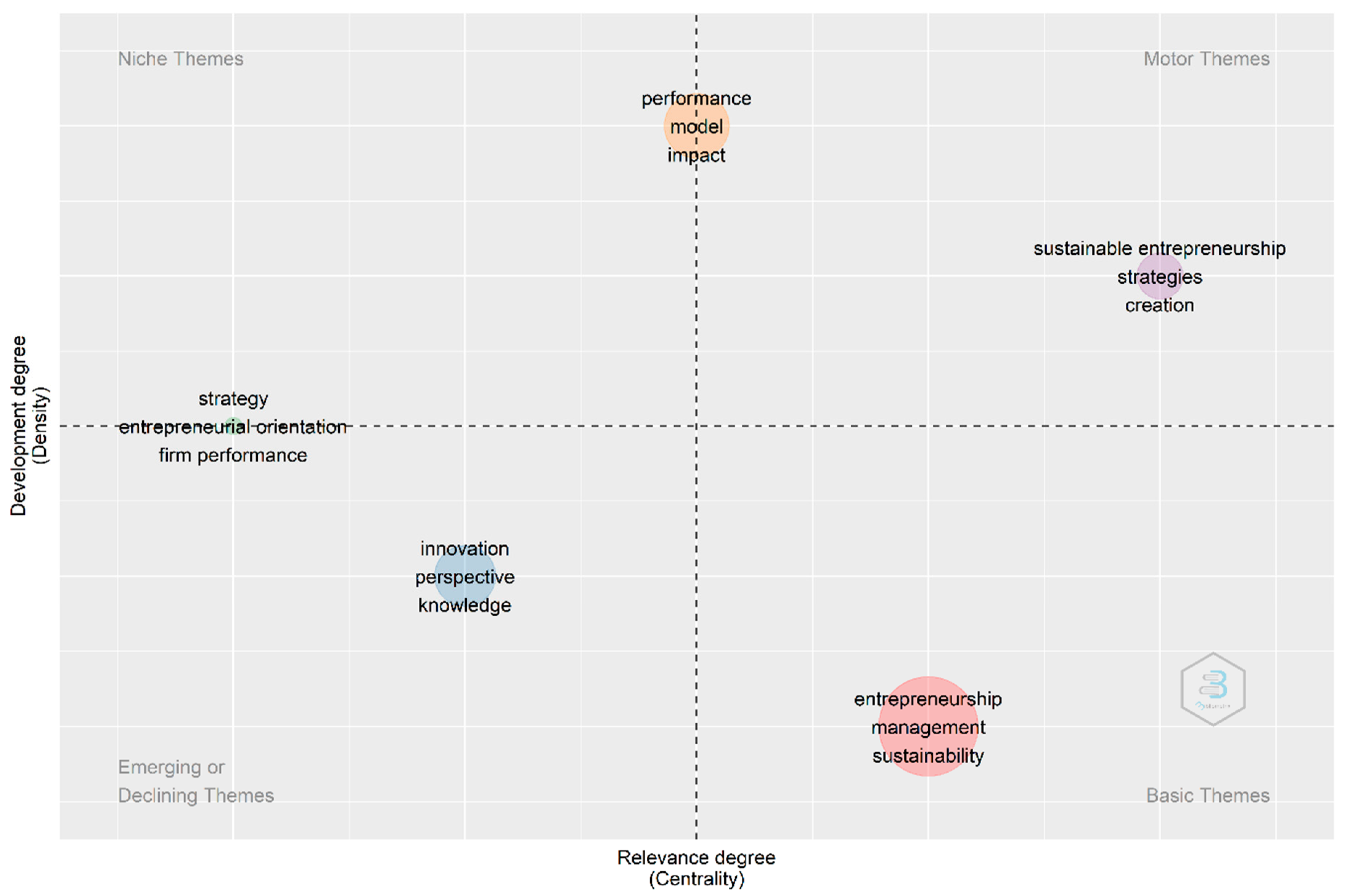
| Global South | Global North | ||||
|---|---|---|---|---|---|
| Journal | Documents | Citations | Journal | Documents | Citations |
| Journal of Business Ethics (The Netherlands) | 5 | 276 | Journal of Business Venturing (United States) | 20 | 3719 |
| Technovation (United Kingdom) | 3 | 128 | Business Strategy and the Environment (United Kingdom) | 58 | 2132 |
| Strategic Management Journal (United Kingdom) | 1 | 105 | Research Policy (The Netherlands) | 13 | 1886 |
| Journal of Business Research (United States) | 6 | 103 | Journal of Business Ethics (The Netherlands) | 40 | 1874 |
| Journal of Entrepreneurship in Emerging Economies (United Kingdom) | 17 | 102 | Technological Forecasting and Social Change (United States) | 38 | 1270 |
| Author | Article | Citations | Journal | |
|---|---|---|---|---|
| Global South | Nga and Shamuganathan [35] | The influence of personality traits and demographic factors on social entrepreneurship start up intentions | 263 | Journal of Business Ethics |
| Lazzarini [36] | Strategizing by the government: Can industrial policy create firm-level competitive advantage? | 105 | Strategic Management Journal | |
| Fathian et al. [37] | E-readiness assessment of non-profit ICT SMEs in a developing country: The case of Iran | 94 | Technovation | |
| Anwar [38] | Business model innovation and SMEs performance—does competitive advantage mediate? | 76 | International Journal of Innovation Management | |
| Khan et al [39] | Investment in intangible resources and capabilities spurs sustainable competitive advantage and firm performance | 61 | Corporate Social Responsibility and Environmental Management | |
| Global North | Schaltegger and Wagner [40] | Sustainable entrepreneurship and sustainability innovation: categories and interactions | 627 | Business Strategy and the Environment |
| Doherty et al. [41] | Social enterprises as hybrid organizations: A review and research agenda | 587 | International Journal of Management Reviews | |
| Dean and McMullen [42] | Toward a theory of sustainable entrepreneurship: Reducing environmental degradation through entrepreneurial action | 580 | Journal of Business Venturing | |
| Cohen and Winn [43] | Market imperfections, opportunity, and sustainable entrepreneurship | 560 | Journal of Business Venturing | |
| Vohora et al. [44] | Critical junctures in the development of university high-tech spinout companies | 533 | Research Policy |
| Authors | Cited Reference | Citations |
|---|---|---|
| Barney [45] * | Firm resources and sustained competitive advantage | 38 |
| Lumpkin and Dess [46] * | Clarifying the entrepreneurial orientation construct and linking it to performance | 33 |
| Austin et al. [47] * | Social and commercial entrepreneurship: same, different, or both? | 29 |
| Cohen and Winn [43] * | Market imperfections, opportunity, and sustainable entrepreneurship | 21 |
| Dean and McMullen [42] * | Toward a theory of sustainable entrepreneurship: Reducing environmental degradation through entrepreneurial action | 20 |
| Hall et al. [48] * | Sustainable development and entrepreneurship: Past contributions and future directions | 20 |
| Mair and Marti [49] * | Social entrepreneurship research: A source of explanation, prediction, and delight | 34 |
| Schaltegger and Wagner [40] * | Sustainable entrepreneurship and sustainability innovation: categories and interactions | 26 |
| Shane and Venkataraman [50] * | The promise of entrepreneurship as a field of research | 24 |
| Covin and Slevin [51] | Strategic management of small firms in hostile and benign environments | 20 |
| Fornell and Larcker [52] | Evaluating structural equation models with unobservable variables and measurement error | 47 |
| Hair Jr, et al. [53] | Partial least squares structural equation modeling (PLS-SEM): An emerging tool in business research | 28 |
| Podsakoff et al. [54] | Common method biases in behavioral research: a critical review of the literature and recommended remedies | 26 |
| Teece et al. [55] | Dynamic capabilities and strategic management | 23 |
| Authors | Document Title | Main Topic (Qualitative Analysis) |
|---|---|---|
| Cohen and Amorós [56] | Municipal demand-side policy tools and the strategic management of technology life cycles. | Cluster 1. Policy making and business management |
| Lazzarini [36] | Strategizing by the government: Can industrial policy create firm-level competitive advantage? | |
| Omri [57] | Entrepreneurship, sectorial outputs, and environmental improvement: International evidence. | |
| Pan et al. [58] | Innovation resources integration pattern in high-tech entrepreneurial enterprises. | |
| Fathian et al. [37] | E-readiness assessment of non-profit ICT SMEs in a developing country: The case of Iran. | Cluster 2. Technology and innovation in SMEs |
| Xie et al. [59] | What affects the innovation performance of small and medium-sized enterprises in China? | |
| Yu et al. [60] | Strategies, technologies, and organizational learning for developing organizational innovativeness in emerging economies. | |
| Yunis et al. [61] | Impact of ICT-based innovations on organizational performance: The role of corporate entrepreneurship. | |
| Anwar [38] | Business model innovation and SMEs performance—does competitive advantage mediate? | Cluster 3. Competitive advantage and performance |
| Khan et al. [39] | Investment in intangible resources and capabilities spurs sustainable competitive advantage and firm performance. | |
| Suntikul and Jachna [62] | Contestation and negotiation of heritage conservation in Luang Prabang, Laos. | |
| Dionisio [63] | The evolution of social entrepreneurship research: a bibliometric analysis. | Cluster 4. Social entrepreneurship |
| Jabeen et al. [64] | Entrepreneurial mindset and the role of universities as strategic drivers of entrepreneurship: Evidence from the United Arab Emirates. | |
| Nga and Shamuganathan [35] | The influence of personality traits and demographic factors on social entrepreneurship start-up intentions. | |
| Roy and Karna [65] | Doing social good on a sustainable basis: competitive advantage of social businesses. | |
| Bamgbade et al. [66] | Does government support matter? Influence of organizational culture on sustainable construction among Malaysian contractors. | Cluster 5. Management of successful entrepreneurship |
| Ng and Kee [67] | The core competence of successful owner-managed SMEs. | |
| Martens et al. [68] | Linking entrepreneurial orientation to project success. | |
| Buli [69] | Entrepreneurial orientation, market orientation, and performance of SMEs in the manufacturing industry: Evidence from Ethiopian enterprises. | Cluster 6. Entrepreneurship and development in the local industry |
| Jaafar and Rasoolimanesh [70] | Tourism growth and entrepreneurship: Empirical analysis of the development of rural highlands. |
| Authors | Document Title | Main Topic |
|---|---|---|
| Chabowski et al. [71] | The structure of sustainability research in marketing, 1958–2008: a basis for future research opportunities | Cluster 1. Social sustainability and innovation |
| Etzion and Ferraro [72] | The role of analogy in the institutionalization of sustainability reporting | |
| Neubaum and Zahra [73] | Institutional ownership and corporate social performance: The moderating effects of investment horizon, activism, and coordination | |
| Paulraj [74] | Understanding the relationships between internal resources and capabilities, sustainable supply management, and organizational sustainability. | |
| Schot and Steinmueller [75] | Three frames for innovation policy: R&D, systems of innovation, and transformative change | |
| Van der Have and Rubalcaba [76] | Social innovation research: An emerging area of innovation studies? | |
| Vohora et al. [44] | Critical junctures in the development of university high-tech spinout companies. | |
| Bohnsack et al. [77] | Business models for sustainable technologies: Exploring business model evolution in the case of electric vehicles | Cluster 2. Sustainable entrepreneurship business models and sustainable development |
| Hall et al. [48] | Sustainable development and entrepreneurship: Past contributions and future directions | |
| Hockerts and Wüstenhagen [78] | Greening Goliaths versus emerging Davids—Theorizing about the role of incumbents and new entrants in sustainable entrepreneurship. | |
| Linder and Williander [79] | Circular business model innovation: inherent uncertainties | |
| Parrish [80] | Sustainability-driven entrepreneurship: Principles of organization design. | |
| Schaltegger et al. [81] | Business models for sustainability: A co-evolutionary analysis of sustainable entrepreneurship, innovation, and transformation | |
| Cohen and Winn [43] | Market imperfections, opportunity, and sustainable entrepreneurship | Cluster 3. Conceptualization of sustainable entrepreneurship |
| Dean and McMullen [42] | Toward a theory of sustainable entrepreneurship: Reducing environmental degradation through entrepreneurial action | |
| Meek et al. [82] | The impact of social norms on entrepreneurial action: Evidence from the environmental entrepreneurship context. | |
| Pacheco et al. [83] | Escaping the green prison: Entrepreneurship and the creation of opportunities for sustainable development | |
| York and Venkataraman [84] | The entrepreneur–environment nexus: Uncertainty, innovation, and allocation | |
| Jenkins [85] | A ‘business opportunity’ model of corporate social responsibility for small-and medium-sized enterprises. | Cluster 4. Sustainability and sustainable entrepreneurship |
| Kuckertz and Wagner [86] | The influence of sustainability orientation on entrepreneurial intentions—Investigating the role of business experience | |
| Schaltegger and Wagner [40] | Sustainable entrepreneurship and sustainability innovation: categories and interactions | |
| Doherty et al. [41] | Social enterprises as hybrid organizations: A review and research agenda | Cluster 5. Social enterprises and social entrepreneurship |
| Ryan [87] | Equity, management, power sharing, and sustainability—issues of the ‘new tourism.’ | |
| Santos [88] | A positive theory of social entrepreneurship |
| Global South | Global North |
|---|---|
| 1. Entrepreneurship, Sustainability, Business, Sustainable development, Social entrepreneurship, 2. Performance, Impact, Management, Entrepreneurial orientation, Firm performance, 3. Strategy, Growth, Competitive advantage, Determinants, Resource-based view, 4. Innovation, Knowledge, Technology. | 1. Entrepreneurship, Sustainability, Innovation, Social entrepreneurship, Sustainable development, 2. Performance, Strategy, Impact, Entrepreneurial orientation, Knowledge, 3. Management, Corporate social responsibility, Model, Business, Strategy, 4. Sustainable entrepreneurship, Organizations, Opportunities, Legitimacy, Institutional entrepreneurship. |
Disclaimer/Publisher’s Note: The statements, opinions and data contained in all publications are solely those of the individual author(s) and contributor(s) and not of MDPI and/or the editor(s). MDPI and/or the editor(s) disclaim responsibility for any injury to people or property resulting from any ideas, methods, instructions or products referred to in the content. |
© 2022 by the authors. Licensee MDPI, Basel, Switzerland. This article is an open access article distributed under the terms and conditions of the Creative Commons Attribution (CC BY) license (https://creativecommons.org/licenses/by/4.0/).
Share and Cite
Contreras, F.; Dornberger, U. Sustainable Entrepreneurship as a Field of Knowledge: Analyzing the Global South. Sustainability 2023, 15, 31. https://doi.org/10.3390/su15010031
Contreras F, Dornberger U. Sustainable Entrepreneurship as a Field of Knowledge: Analyzing the Global South. Sustainability. 2023; 15(1):31. https://doi.org/10.3390/su15010031
Chicago/Turabian StyleContreras, Francoise, and Utz Dornberger. 2023. "Sustainable Entrepreneurship as a Field of Knowledge: Analyzing the Global South" Sustainability 15, no. 1: 31. https://doi.org/10.3390/su15010031
APA StyleContreras, F., & Dornberger, U. (2023). Sustainable Entrepreneurship as a Field of Knowledge: Analyzing the Global South. Sustainability, 15(1), 31. https://doi.org/10.3390/su15010031







